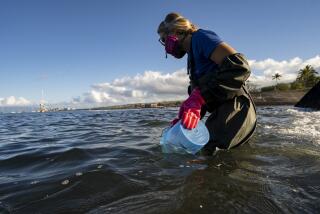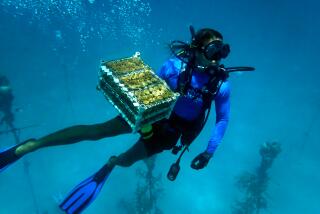Oil spill remedies are toxic to coral, researchers find
- Share via
Chemicals frequently used to clean up oil spills in marine environments turn out to be more toxic to coral reefs than the oil itself, researchers said this week.
Previous research indicated serious effects of these oil dispersants on coral larvae. In this study, published in the current issue of the journal Environmental Science and Technology, researchers in Israel used a new technique to test the effect on adult corals and found devastating results.
“When applied next to a reef, dispersants are hurting coral and maybe other creatures too,” said lead researcher and marine biologist Shai Shafir of the National Institute of Oceanography in Haifa and Hebrew University of Jerusalem.
Oil dispersants work by breaking oil into very small drops that can be dissolved in water.
In the study, more than 10,000 tiny fragments of two common species of coral -- each far smaller than a square centimeter -- were harvested without harm to the mother coral and transported to a lab.
Shafir and his colleagues tested the toxicity of both oil and oil dispersants in different concentrations.
They found that oil itself had no effect, but the six dispersants at manufacturer-recommended concentrations killed all of the coral. With all but one dispersant, concentrations as weak as 25% of the recommended level also resulted in 100% mortality.
The team recommended using dispersants near coral reefs only in emergencies.
“Dispersant is a good method in open sea, far away from corals,” Shafir said.
He added that other clean-up techniques could be used near reefs, such as collecting oil, burning it or sucking it out of the water.
More to Read
Sign up for Essential California
The most important California stories and recommendations in your inbox every morning.
You may occasionally receive promotional content from the Los Angeles Times.












